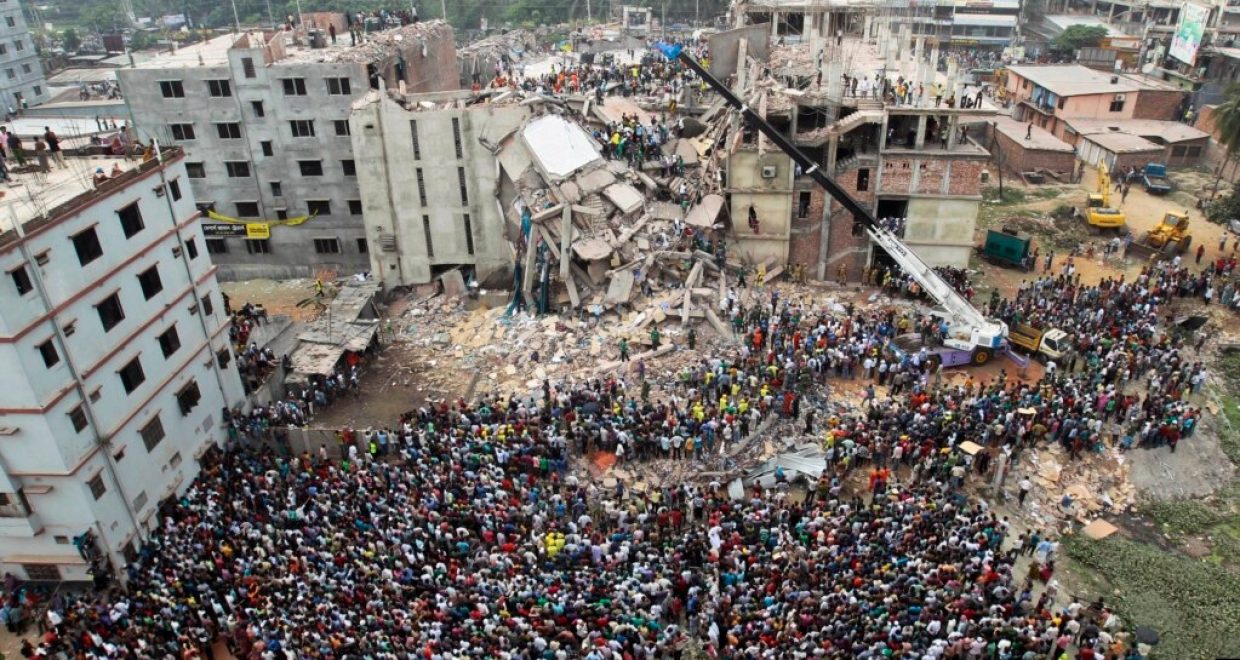10 years on from Rana Plaza: Is France’s duty of vigilance law living up to its promise?
The Rana Plaza collapse in 2013 in Bangladesh exposed the severe safety issues and exploitative practices in global supply chains and the need for greater corporate liability. This disaster was not the first one but it enabled civil society organisations and global movements to be audible when advocating for legal frameworks that would hold parent companies accountable for the actions of their subcontractors. The Rana Plaza disaster provided a catalyst and wider legitimacy for the cause and served in France to set up a NGOs task force amongst which Sherpa was a key leader and a driving force behind the duty of vigilance legislation. During the parliamentary debates, Sherpa filed two lawsuits, against Vinci and against Lafarge to reveal the violations and tragedies that occur because of multinationals’ activities. The inadequacy of the current legal framework was exposed.
The coalition’s persistence and collaboration with political representatives eventually led to the enactment of the law in 2017. This unprecedented law aims to hold parent companies responsible for addressing and preventing negative impacts on human rights and the environment throughout their supply chains, and provides judicial avenues for victims.
More than ten years on from the Rana Plaza collapse, it is important to reflect on the impact of the French law on the duty of vigilance, which was enacted in response to this tragedy.
The “Rana Plaza law”… Not really
Despite NGOs advocacy, the French law on the duty of vigilance is not a fully effective tool to compel companies to prevent and remedy negative impacts on human rights and the environment, due to some limitations.
The law is sometimes referred to as the “Rana Plaza law”, however, it is misleading since some French companies whose clothes were found in the rubble are not covered by the law: the application thresholds (over 5,000 employees in France or 10,000 worldwide, including in the company’s subsidiaries) are too high, excluding many large French companies operating worldwide with significant turnover.
Additionally, in the absence of an official list of companies covered, it is often difficult to assess whether a company meets the thresholds provided by the law. Sherpa and CCFD-Terre Solidaire have tried to remedy this shortcoming by launching the “Vigilance Radar” publishing a non-exhaustive list of companies covered by the law along with their respective vigilance plan when they have made it public, based on public and private databases.
Access to justice and remedies is also challenging, as claimants must prove wrongful acts, harm suffered, and causation. Strict interpretations of causation may therefore not hold companies liable for events like the Rana Plaza collapse.
While the shortcomings inherent to the law present challenges for its effectiveness, another significant concern arises from the threats on the implementation of the law itself.
A threatened law?
The essence of the law is at risk due to formalistic interpretations and worrying case law, potentially undermining the law’s intended impact on corporate accountability.
Due to substantial differences between their initial and current claims, the case led by the Friends of the Earth and other NGOs against TotalEnergies was declared inadmissible on 28 February this year. The court’s decision, if upheld, would prevent any updating or amending of claims after a formal notice is sent, even if new violations arise or the company publishes a new vigilance plan. The court would only consider the circumstances at the time of the formal notice, rather than taking into account the current situation.
Another concern is the narrow and formalistic interpretation by the court of the law that reduces the duty of vigilance to a mere compliance exercise, contrasting with the legislator’s intention for a legal obligation of prudent and diligent conduct.
Additionally, companies often employ tactics to prolong legal proceedings and frustrate the pursuit of justice for affected individuals and communities, which include challenging jurisdiction, or raising endless procedural issues. For example, companies have claimed that due vigilance litigation should be under the jurisdiction of the commercial court, not the ordinary civil courts. This interpretation misconstrues the duty of vigilance, which should be viewed as a duty of care towards third parties to safeguard their fundamental rights, rather than as an internal corporate management concern. This particular dispute took years to resolve, with the Paris civil court ultimately being deemed the appropriate jurisdiction, as decided by recent legislation Sherpa and partners advocated for. This is particularly detrimental in cases involving human rights and environmental violations, where timely intervention is crucial for preventing further harm and ensuring effective remediation.
In addition, to ensure victims can access justice, it is crucial to reverse the burden of proof. We had suggested in the draft proposal of the law a presumption of fault, requiring companies to prove they took necessary measures to prevent human rights and environmental abuses. Moreover, facilitating judicial access to relevant evidence held by companies was suggested but defeated by the government’s opposition to it.
In conclusion, the law on the duty of vigilance is a major step towards corporate accountability, but inherent limitations and threats to its interpretation and implementation call for further enhancements to ensure its effectiveness. The future EU Directive presents a unique opportunity to address these concerns and strengthen the legal framework for corporate accountability. By learning from the experiences and challenges faced in the implementation of the French law, this Directive has the potential to not only address the limitations of the French law but also to serve as a model for other jurisdictions, ultimately contributing to a more just and sustainable global economic system.
Sandra Cossart is Sherpa’s Executive Director and Roula Mamlouk is the Advocacy and Litigation Officer.
Read more on this topic in the Business and Human Rights Journal, including “Beyond Rana Plaza: Next Steps for the Global Garment Industry and Bangladeshi Manufacturers” by Motoko AIZAWA and Salil TRIPATHI.



